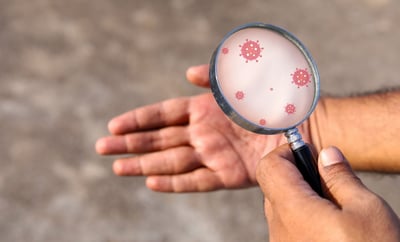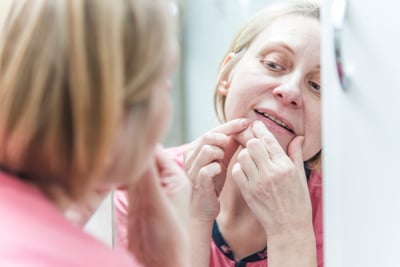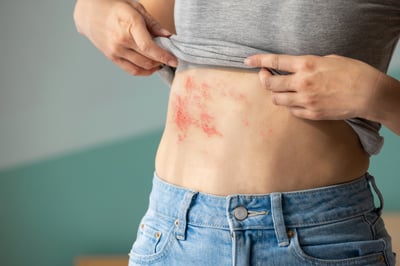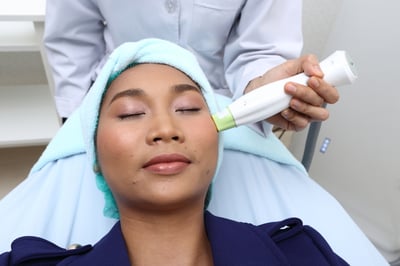
Psoriasis is a skin disease associated with the immune system which causes your skin cells to reproduce too quickly. According to Dr. Victoria Negrete, board-certified dermatologist with Forefront Dermatology, “a normal skin cell matures and falls off the body’s surface in 28 to 30 days. However, skin affected by psoriasis takes only three to four days to mature and move to the surface. Instead of the cells falling off, they pile up and form scaly lesions.”
Symptoms of Psoriasis
There are 5 main types of psoriasis and each come with own symptoms:
• Plaque psoriasis is the most prevalent form of psoriasis and appears as raised, red patches or lesions covered with a silvery white build-up of dead skin cells, called scales. It is typically found on the elbows, knees, scalp and lower back.
• Guttate is a form of psoriasis that often starts in childhood but can be seen in young adults. It appears as small, red, individual spots and is typically found on the trunk, limbs and scalp.
• Pustular is primarily seen in adults and is characterized by pus-filled, blister-like lesions and intense scaling. It is typically found on the palms of the hands and soles of the feet, but can occur anywhere on the body.
• Inverse is characterized by intense inflammation in the folds of the skin such as the armpits, groin, under the breasts and buttocks. It appears as bright red lesions that are smooth and shiny.
• Erythrodermic is the least common form or psoriasis and also the most dangerous form. It is characterized by periodic, widespread, fiery redness of the skin and the shedding of scales in sheets, rather than smaller flakes. The reddening and shedding of the skin are often accompanied by severe itching and pain, heart rate increase, and fluctuating body temperature. If this rare form develops, see your dermatologist immediately.
Am I at risk for psoriasis?
Anyone can develop psoriasis – approximately 125 million people worldwide have psoriasis – but these factors can increase your risk of developing the disease:
• Family history – This is one of the most significant risk factors. Having one parent with psoriasis increases your risk of getting the disease, and having two parents with psoriasis increases your risk even more.
• Viral and bacterial infections – People with HIV are more likely to develop psoriasis than people with healthy immune systems are. Children and young adults with recurring infections, particularly strep throat, also may be at increased risk.
• Stress – Because stress can impact your immune system, high stress levels may increase your risk of psoriasis.
• Obesity – Excess weight increases the risk of psoriasis. Lesions (plaques) associated with all types of psoriasis often develop in skin creases and folds.
• Smoking – Smoking tobacco not only increases your risk of psoriasis but also may increase the severity of the disease. Smoking may also play a role in the initial development of the disease.
What triggers psoriasis?
People with psoriasis have flare ups that are caused by “triggers.” Triggers are not universal – what may cause one person’s psoriasis to become active may not affect another’s. There are four main factors that are recognized as triggers that may induce flare ups:
• Stress – it is common for 30 to 50 percent of patients to report a flare up following stress, usually within 30 days of the stress event. It is important for psoriasis sufferers to effectively cope with stress.
• Skin Injury – studies have shown that up to 90 percent of patients have a flare up that will develop in the injured site as it heals.
• Infection – a study of 245 children revealed that 25 percent had an onset of psoriasis following an infection such as upper respiratory infections. Infections are a common trigger to the guttate subtype of psoriasis.
• Alcohol – researchers believe that heavy alcohol consumption affects psoriasis by slowing down or stopping the effects of the medications, lowering your immune function, increasing inflammation and causing dehydration. All of these effects of alcohol consumption tie heavily into the healthiness of your skin.
How is psoriasis treated?
While there is no cure for psoriasis, there are treatment options available to help prevent flare ups and alleviate the symptoms. Treatment depends on how serious the disease, the size of the psoriasis patches and the type of psoriasis. Treatments work differently for each sufferer. Your dermatologist may switch treatments if one doesn’t work, if there is a bad reaction or if your current treatment stops working. Common treatment options include topical treatments, light therapy, prescription medication or combination therapy.
Struggling with Psoriasis?
The board-certified dermatologists at Forefront Dermatology are specialists in psoriasis and psoriasis treatment. Find a dermatologist near you and schedule your consultation today.





